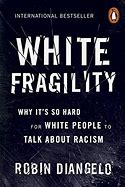White Fragility has made an indelible impact on my psyche. I have been avoiding this book for about a year. My friend has been encouraging me to read it in order to confront my racism. My excuse was that I did not want to; racism is an uncomfortable subject and I would rather avoid it. Frankly, I was certain I was not really a racist so why read the book? The times that we are in, the murder of George Floyd, and what is going on around us forced the issue.
What is brilliant about Robin DiAngelo’s White Fragility is why it’s so hard for white people to talk about racism. What is outlined in the book is exactly my own white fragility around how hard it is for me to deal with and talk about race and racism. That is what had me avoiding reading the book. It for me has been a hard and difficult read. As I struggled with the book, I had to rearrange some of my strongly held beliefs and confront that some of my accomplishments were a function of white privilege. This for me was hard in that I had thought all of my success had come from just hard work and some luck. I now think differently.
This book is researched and thorough. It begins with the challenges of talking to white people about race and racism and then dives into illuminating our white supremacy culture. There are no punches pulled here, no sugar coating. Our history between the white and African American races is fully reviewed and exposed. That is then connected with what is now occurring. I cannot and will not run from the systematic racism that exists everywhere in this country. Just look at the neighborhoods, the schools, and the penal system. When you look at what really exists the reality that racism exists is undeniable. This book helped me take off blinders that I did not even know I had on. Through the reading blind spots were revealed in how I see and experience the world.
The book then goes into how racism has shaped the lives of white people and how we have developed white fragility as a response. Our racial triggers and our stance of anti-blackness are highlighted. The book concludes with how to deal with one’s own white fragility and those of others. Next steps and possibilities are outlined.
I request that you read this book. For me, this was and is an uncomfortable task. I request that you begin the journey towards being someone who can talk about and confront racism. I request that you act towards ending racism. The way into that is admitting that it exists and that you are a part of it. This review is bound to raise issues and create reactions. I welcome your thoughts and comments and look forward to the dialogue.
Keep causing and creating!
